Ratings of Organizational Citizenship Behavior
- 格式:pdf
- 大小:126.73 KB
- 文档页数:18
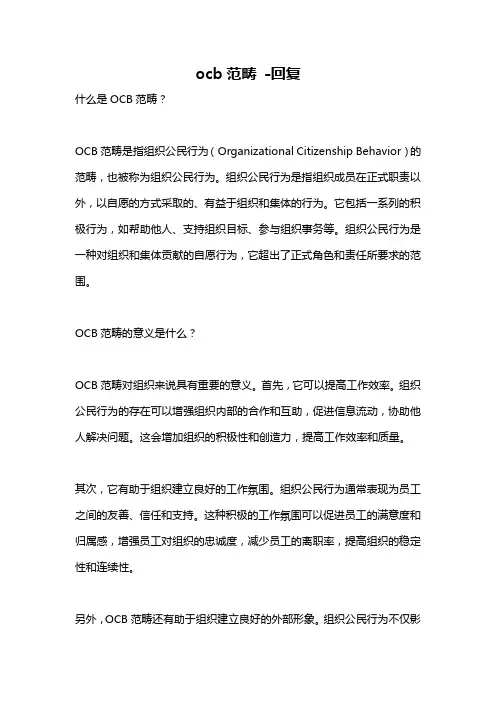
ocb范畴-回复什么是OCB范畴?OCB范畴是指组织公民行为(Organizational Citizenship Behavior)的范畴,也被称为组织公民行为。
组织公民行为是指组织成员在正式职责以外,以自愿的方式采取的、有益于组织和集体的行为。
它包括一系列的积极行为,如帮助他人、支持组织目标、参与组织事务等。
组织公民行为是一种对组织和集体贡献的自愿行为,它超出了正式角色和责任所要求的范围。
OCB范畴的意义是什么?OCB范畴对组织来说具有重要的意义。
首先,它可以提高工作效率。
组织公民行为的存在可以增强组织内部的合作和互助,促进信息流动,协助他人解决问题。
这会增加组织的积极性和创造力,提高工作效率和质量。
其次,它有助于组织建立良好的工作氛围。
组织公民行为通常表现为员工之间的友善、信任和支持。
这种积极的工作氛围可以促进员工的满意度和归属感,增强员工对组织的忠诚度,减少员工的离职率,提高组织的稳定性和连续性。
另外,OCB范畴还有助于组织建立良好的外部形象。
组织公民行为不仅影响组织内部的运行,也会对外部产生积极影响。
例如,支持社会公益事业、参与社区活动等,会提升组织的社会责任感和企业形象,增强公众对组织的好感和信任度。
如何促进员工的OCB范畴行为?要促进员工的OCB范畴行为,组织可以采取以下措施:1.建立积极的组织文化:组织应该倡导和强调互助、友善和支持的价值观。
通过正式和非正式的机制,如员工培训、讲座、员工活动等,向员工灌输公民行为的重要性,激发员工的积极意识。
2.设立公民行为的激励机制:组织可以通过奖励机制来激励员工的公民行为。
可以设立相关的绩效指标,并与绩效评估和奖励制度相结合,将公民行为纳入绩效考核的重要因素之一。
3.建立有效的沟通渠道:组织应该建立良好的沟通渠道,使员工能够分享信息、解决问题和表达意见。
良好的沟通可以提高员工的工作满意度和归属感,激发员工的公民行为。
4.培养员工的团队合作能力:团队合作是促进组织公民行为的重要因素之一。
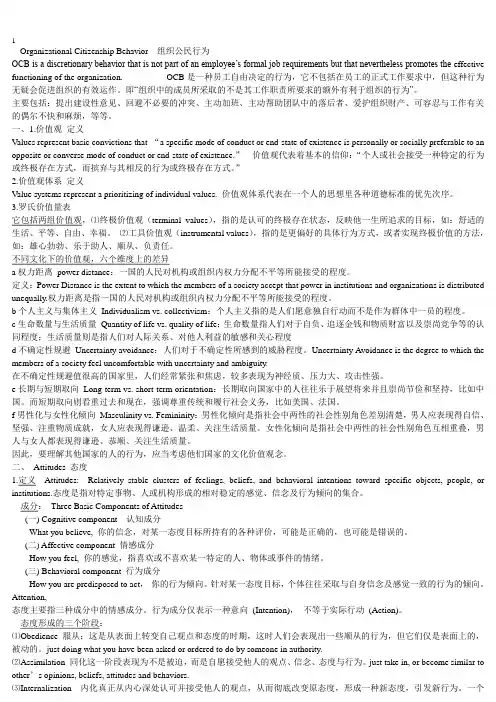
Organizational Citizenship Behavior 组织公民行为OCB is a discretionary behavior that is not part of an employee’s formal job requirements but that nevertheless promotes the effective functioning of the organization. OCB是一种员工自由决定的行为,它不包括在员工的正式工作要求中,但这种行为无疑会促进组织的有效运作。
即“组织中的成员所采取的不是其工作职责所要求的额外有利于组织的行为”。
主要包括:提出建设性意见、回避不必要的冲突、主动加班、主动帮助团队中的落后者、爱护组织财产、可容忍与工作有关的偶尔不快和麻烦,等等。
一、1.价值观定义Values represent basic convictions that “a specific mode of conduct or end-state of existence is personally or socially preferable to an opposite or converse mode of conduct or end-state of existence.”价值观代表着基本的信仰:“个人或社会接受一种特定的行为或终极存在方式,而摈弃与其相反的行为或终极存在方式。
”2.价值观体系定义Value systems represent a prioritizing of individual values. 价值观体系代表在一个人的思想里各种道德标准的优先次序。
3.罗氏价值量表它包括两组价值观,⑴终极价值观(terminal values),指的是认可的终极存在状态,反映他一生所追求的目标,如:舒适的生活、平等、自由、幸福。
⑵工具价值观(instrumental values),指的是更偏好的具体行为方式,或者实现终极价值的方法,如:雄心勃勃、乐于助人、顺从、负责任。
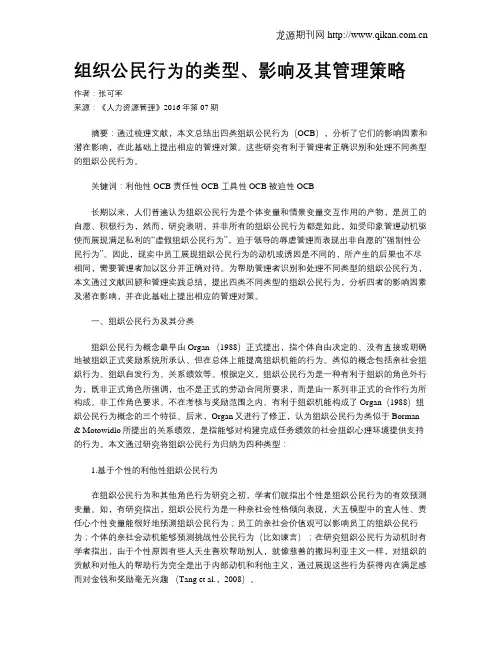
组织公民行为的类型、影响及其管理策略作者:张可军来源:《人力资源管理》2016年第07期摘要:通过梳理文献,本文总结出四类组织公民行为(OCB),分析了它们的影响因素和潜在影响,在此基础上提出相应的管理对策。
这些研究有利于管理者正确识别和处理不同类型的组织公民行为。
关键词:利他性OCB 责任性OCB 工具性OCB 被迫性OCB长期以来,人们普遍认为组织公民行为是个体变量和情景变量交互作用的产物,是员工的自愿、积极行为,然而,研究表明,并非所有的组织公民行为都是如此,如受印象管理动机驱使而展现满足私利的“虚假组织公民行为”,迫于领导的辱虐管理而表现出非自愿的“强制性公民行为”。
因此,现实中员工展现组织公民行为的动机或诱因是不同的,所产生的后果也不尽相同,需要管理者加以区分并正确对待。
为帮助管理者识别和处理不同类型的组织公民行为,本文通过文献回顾和管理实践总结,提出四类不同类型的组织公民行为,分析四者的影响因素及潜在影响,并在此基础上提出相应的管理对策。
一、组织公民行为及其分类组织公民行为概念最早由Organ (1988)正式提出,指个体自由决定的、没有直接或明确地被组织正式奖励系统所承认、但在总体上能提高组织机能的行为。
类似的概念包括亲社会组织行为、组织自发行为、关系绩效等。
根据定义,组织公民行为是一种有利于组织的角色外行为,既非正式角色所强调,也不是正式的劳动合同所要求,而是由一系列非正式的合作行为所构成。
非工作角色要求、不在考核与奖励范围之内、有利于组织机能构成了Organ(1988)组织公民行为概念的三个特征。
后来,Organ又进行了修正,认为组织公民行为类似于Borman & Motowidlo所提出的关系绩效,是指能够对构建完成任务绩效的社会组织心理环境提供支持的行为。
本文通过研究将组织公民行为归纳为四种类型:1.基于个性的利他性组织公民行为在组织公民行为和其他角色行为研究之初,学者们就指出个性是组织公民行为的有效预测变量。
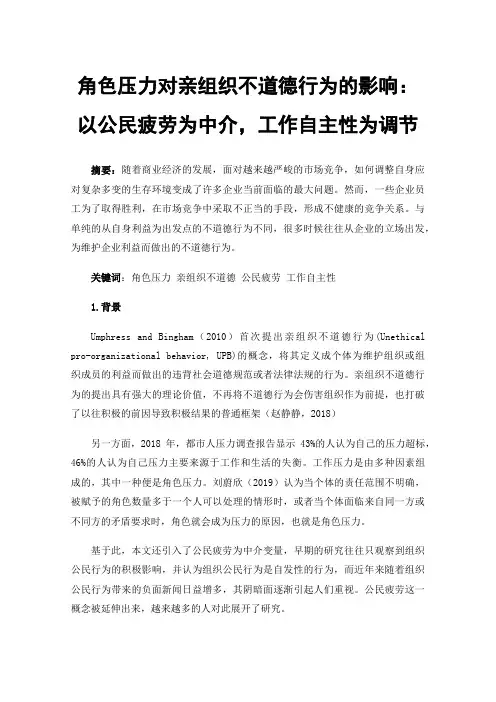
角色压力对亲组织不道德行为的影响:以公民疲劳为中介,工作自主性为调节摘要:随着商业经济的发展,面对越来越严峻的市场竞争,如何调整自身应对复杂多变的生存环境变成了许多企业当前面临的最大问题。
然而,一些企业员工为了取得胜利,在市场竞争中采取不正当的手段,形成不健康的竞争关系。
与单纯的从自身利益为出发点的不道德行为不同,很多时候往往从企业的立场出发,为维护企业利益而做出的不道德行为。
关键词:角色压力亲组织不道德公民疲劳工作自主性1.背景Umphress and Bingham(2010)首次提出亲组织不道德行为(Unethical pro-organizational behavior, UPB)的概念,将其定义成个体为维护组织或组织成员的利益而做出的违背社会道德规范或者法律法规的行为。
亲组织不道德行为的提出具有强大的理论价值,不再将不道德行为会伤害组织作为前提,也打破了以往积极的前因导致积极结果的普通框架(赵静静,2018)另一方面,2018年,都市人压力调查报告显示43%的人认为自己的压力超标,46%的人认为自己压力主要来源于工作和生活的失衡。
工作压力是由多种因素组成的,其中一种便是角色压力。
刘蔚欣(2019)认为当个体的责任范围不明确,被赋予的角色数量多于一个人可以处理的情形时,或者当个体面临来自同一方或不同方的矛盾要求时,角色就会成为压力的原因,也就是角色压力。
基于此,本文还引入了公民疲劳为中介变量,早期的研究往往只观察到组织公民行为的积极影响,并认为组织公民行为是自发性的行为,而近年来随着组织公民行为带来的负面新闻日益增多,其阴暗面逐渐引起人们重视。
公民疲劳这一概念被延伸出来,越来越多的人对此展开了研究。
1.研究假设2.1角色压力与亲组织不道德韦慧民和鲁振伟(2017)认为员工感知角色压力过大,尤其是角色超载严重时,常常会伴随着自我控制资源的损耗。
而这无疑耗费员工更多的时间和精力完成角色要求, 严秋思等人(2021)认为,角色压力的存在就意味着个体在约束的框架内无法找到切实可行的方法去解决压力,就会突破道德的管束。
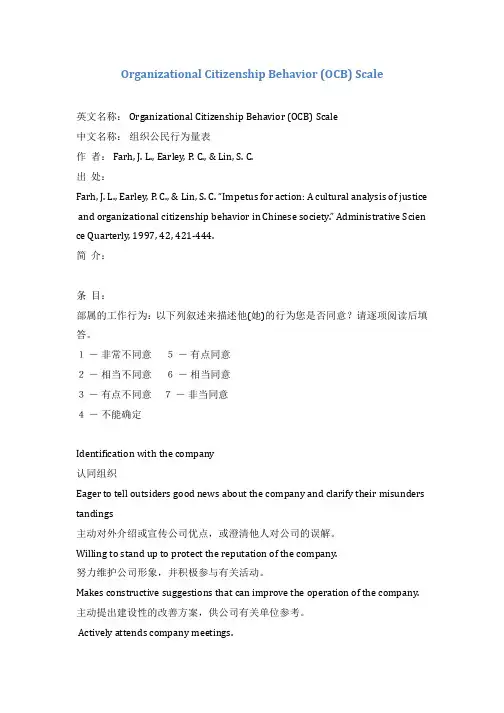
Organizational Citizenship Behavior(OCB)Scale英文名称:Organizational Citizenship Behavior(OCB)Scale中文名称:组织公民行为量表作者:Farh,J.L.,Earley,P.C.,&Lin,S.C.出处:Farh,J.L.,Earley,P.C.,&Lin,S.C.“Impetus for action:A cultural analysis of justice and organizational citizenship behavior in Chinese society.”Administrative Scien ce Quarterly,1997,42,421-444.简介:条目:部属的工作行为:以下列叙述来描述他(她)的行为您是否同意?请逐项阅读后填答。
1-非常不同意5-有点同意2-相当不同意6-相当同意3-有点不同意7-非当同意4-不能确定Identification with the company认同组织Eager to tell outsiders good news about the company and clarify their misunders tandings主动对外介绍或宣传公司优点,或澄清他人对公司的误解。
Willing to stand up to protect the reputation of the company.努力维护公司形象,并积极参与有关活动。
Makes constructive suggestions that can improve the operation of the company.主动提出建设性的改善方案,供公司有关单位参考。
Actively attends company meetings.以积极的态度参与公司内相关会议。
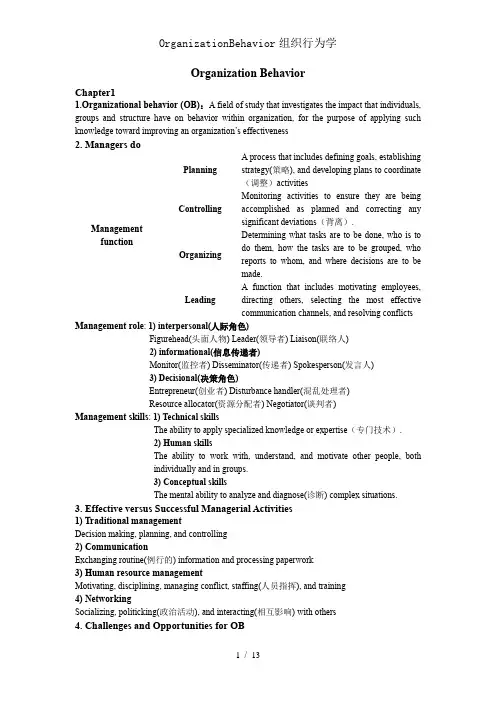
Organization BehaviorChapter1anizational behavior (OB):A field of study that investigates the impact that individuals, groups and structure have on behavior within organization, for the purpose of applying such knowledge toward improving an organization’s effectiveness2. Managers doManagement functionPlanningA process that includes defining goals, establishingstrategy(策略), and developing plans to coordinate(调整)activitiesControllingMonitoring activities to ensure they are beingaccomplished as planned and correcting anysignificant deviations(背离).OrganizingDetermining what tasks are to be done, who is todo them, how the tasks are to be grouped, whoreports to whom, and where decisions are to bemade.LeadingA function that includes motivating employees,directing others, selecting the most effectivecommunication channels, and resolving conflictsManagement role: 1) interpersonal(人际角色)Figurehead(头面人物) Leader(领导者) Liaison(联络人)2) informational(信息传递者)Monitor(监控者) Disseminator(传递者) Spokesperson(发言人)3) Decisional(决策角色)Entrepreneur(创业者) Disturbance handler(混乱处理者)Resource allocator(资源分配者) Negotiator(谈判者)Management skills: 1) Technical skillsThe ability to apply specialized knowledge or expertise(专门技术).2) Human skillsThe ability to work with, understand, and motivate other people, bothindividually and in groups.3) Conceptual skillsThe mental ability to analyze and diagnose(诊断) complex situations.3. Effective versus Successful Managerial Activities1) Traditional managementDecision making, planning, and controlling2) CommunicationExchanging routine(例行的) information and processing paperwork3) Human resource managementMotivating, disciplining, managing conflict, staffing(人员指挥), and training4) NetworkingSocializing, politicking(政治活动), and interacting(相互影响) with others4. Challenges and Opportunities for OB1) Responding to GlobalizationIncreased foreign assignmentsWorking with people from different culturesOverseeing movement of jobs to countries with low-cost labor2) Managing Workforce Diversity(差异,多样性)Embracing diversityChanging demographics(人口)Implications for managersRecognizing and responding to differences3) Improving Quality and ProductivityQuality management (QM)Process reengineering4) Responding to the Labor ShortageChanging work force demographicsFewer skilled laborersEarly retirements and older workers5) Improving Customer ServiceIncreased expectation of service qualityCustomer-responsive cultures6) Improving People Skills7) Empowering(授权) People8) Stimulating(刺激) Innovation(改革) and Change9) Coping with “Temporariness(临时性)”10) Working in Networked Organizations11) Helping Employees Balance Work/Life Conflicts12) Improving Ethical(伦理的) Behavior5. Independent and dependent variables1) individual-level variables个体水平变量人们带着不同的特点进入组织,这些特点将影响到他们在工作中的行为。
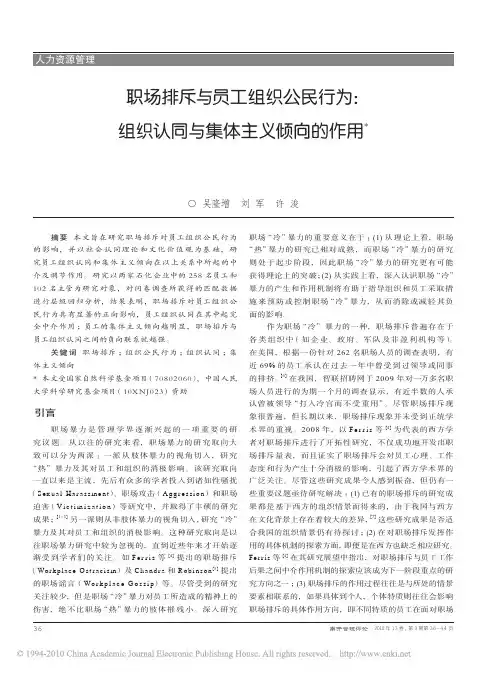
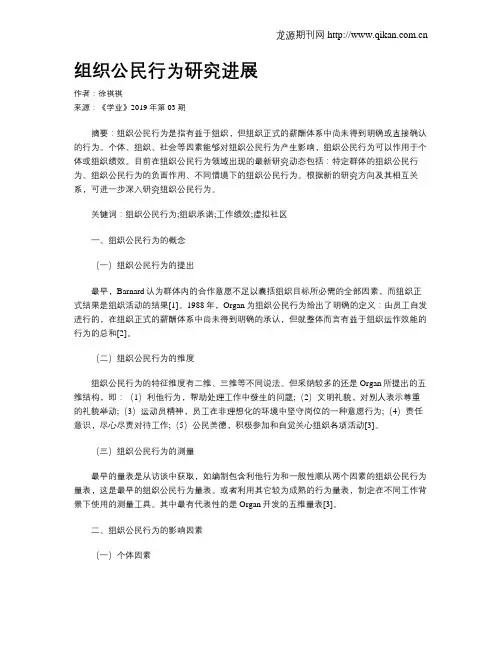
组织公民行为研究进展作者:徐祺祺来源:《学业》2019年第03期摘要:组织公民行为是指有益于组织,但组织正式的薪酬体系中尚未得到明确或直接确认的行为。
个体、组织、社会等因素能够对组织公民行为产生影响,组织公民行为可以作用于个体或组织绩效。
目前在组织公民行为领域出现的最新研究动态包括:特定群体的组织公民行为、组织公民行为的负面作用、不同情境下的组织公民行为。
根据新的研究方向及其相互关系,可进一步深入研究组织公民行为。
关键词:组织公民行为;组织承诺;工作绩效;虚拟社区一、组织公民行为的概念(一)组织公民行为的提出最早,Barnard认为群体内的合作意愿不足以囊括组织目标所必需的全部因素,而组织正式结果是组织活动的结果[1]。
1988年,Organ为组织公民行为给出了明确的定义:由员工自发进行的,在组织正式的薪酬体系中尚未得到明确的承认,但就整体而言有益于组织运作效能的行为的总和[2]。
(二)组织公民行为的维度组织公民行为的特征维度有二维、三维等不同说法。
但采纳较多的还是Organ所提出的五维结构,即:(1)利他行为,帮助处理工作中發生的问题;(2)文明礼貌,对别人表示尊重的礼貌举动;(3)运动员精神,员工在非理想化的环境中坚守岗位的一种意愿行为;(4)责任意识,尽心尽责对待工作;(5)公民美德,积极参加和自觉关心组织各项活动[3]。
(三)组织公民行为的测量最早的量表是从访谈中获取,如编制包含利他行为和一般性顺从两个因素的组织公民行为量表,这是最早的组织公民行为量表。
或者利用其它较为成熟的行为量表,制定在不同工作背景下使用的测量工具。
其中最有代表性的是Organ开发的五维量表[3]。
二、组织公民行为的影响因素(一)个体因素员工的满意感、组织承诺和公平感对组织公民行为有显著的影响。
就工作满意度而言,员工在积极的情绪状态下出现组织公民行为的可能性较大,而在消极的情绪状态下出现组织公民行为的可能性较小。
员工对领导的信任、组织承诺与组织公民行为的各个维度都有着显著正相关,其中员工对领导的信任与总体组织公民行为又密切关系[3]。
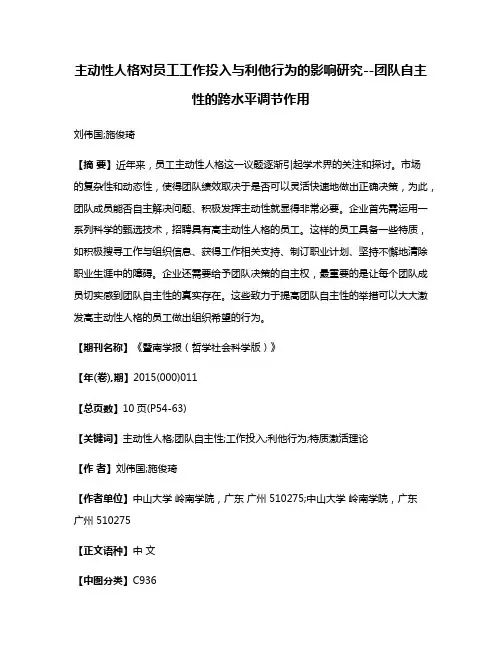
主动性人格对员工工作投入与利他行为的影响研究--团队自主性的跨水平调节作用刘伟国;施俊琦【摘要】近年来,员工主动性人格这一议题逐渐引起学术界的关注和探讨。
市场的复杂性和动态性,使得团队绩效取决于是否可以灵活快速地做出正确决策,为此,团队成员能否自主解决问题、积极发挥主动性就显得非常必要。
企业首先需运用一系列科学的甄选技术,招聘具有高主动性人格的员工。
这样的员工具备一些特质,如积极搜寻工作与组织信息、获得工作相关支持、制订职业计划、坚持不懈地清除职业生涯中的障碍。
企业还需要给予团队决策的自主权,最重要的是让每个团队成员切实感到团队自主性的真实存在。
这些致力于提高团队自主性的举措可以大大激发高主动性人格的员工做出组织希望的行为。
【期刊名称】《暨南学报(哲学社会科学版)》【年(卷),期】2015(000)011【总页数】10页(P54-63)【关键词】主动性人格;团队自主性;工作投入;利他行为;特质激活理论【作者】刘伟国;施俊琦【作者单位】中山大学岭南学院,广东广州 510275;中山大学岭南学院,广东广州 510275【正文语种】中文【中图分类】C936施俊琦(1976—),男,浙江嘉兴人,中山大学岭南学院教授,博士,主要从事组织行为与人力资源研究。
国家自然科学基金青年基金项目《伦理型领导感知差异化对员工不伦理行为的跨层影响机制研究:基于人与情境交互的框架》(批准号:71302102)。
日益激烈的市场竞争和不断变化的消费者需求是大多数企业不得不面临的现实环境,组织内管理的重心已经从监督员工不折不扣地执行上级决策,变为要求员工发挥主动性,自主地去发现和解决问题①Frese M., Fay D., Hilburger T., et al. “The Concept of Personal Initiative: Operationalization,Reliability and Validity in Two German Samples”,Journal of Occupational a nd Organizational Psychology, Vol.70,No.2, 1997,pp.139-161.。
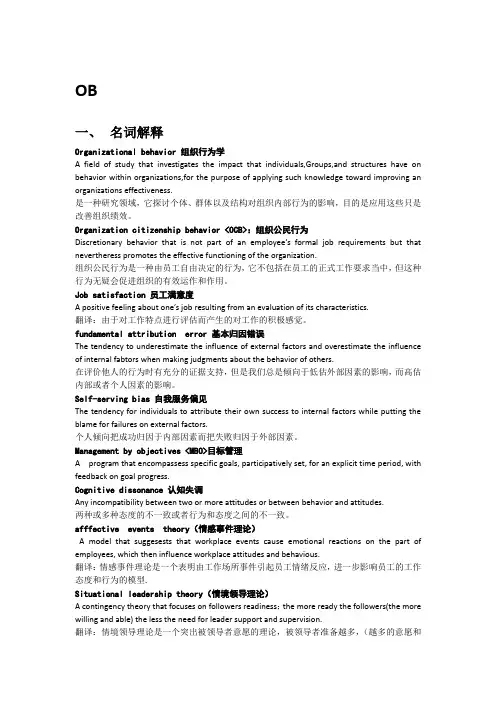
OB 一、 名词解释 Organizational behavior 组织行为学 A field of study that investigates the impact that individuals,Groups,and structures have on behavior within organizations,for the purpose of applying such knowledge toward improving an organizations effectiveness. 是一种研究领域,它探讨个体、群体以及结构对组织内部行为的影响,目的是应用这些只是改善组织绩效。 Organization citizenship behavior :组织公民行为 Discretionary behavior that is not part of an employee’s formal job requirements but that nevertheress promotes the effective functioning of the organization. 组织公民行为是一种由员工自由决定的行为,它不包括在员工的正式工作要求当中,但这种行为无疑会促进组织的有效运作和作用。 Job satisfaction 员工满意度 A positive feeling about one’s job resulting from an evaluation of its characteristics. 翻译:由于对工作特点进行评估而产生的对工作的积极感觉。 fundamental attribution error 基本归因错误 The tendency to underestimate the influence of external factors and overestimate the influence of internal fabtors when making judgments about the behavior of others. 在评价他人的行为时有充分的证据支持,但是我们总是倾向于低估外部因素的影响,而高估内部或者个人因素的影响。 Self-serving bias 自我服务偏见 The tendency for individuals to attribute their own success to internal factors while putting the blame for failures on external factors. 个人倾向把成功归因于内部因素而把失败归因于外部因素。 Management by objectives 目标管理 A program that encompassess specific goals, participatively set, for an explicit time period, with feedback on goal progress. Cognitive dissonance 认知失调 Any incompatibility between two or more attitudes or between behavior and attitudes. 两种或多种态度的不一致或者行为和态度之间的不一致。 afffective events theory(情感事件理论) A model that suggesests that workplace events cause emotional reactions on the part of employees, which then influence workplace attitudes and behavious. 翻译:情感事件理论是一个表明由工作场所事件引起员工情绪反应,进一步影响员工的工作态度和行为的模型. Situational leadership theory(情境领导理论) A contingency theory that focuses on followers readiness;the more ready the followers(the more willing and able) the less the need for leader support and supervision. 翻译:情境领导理论是一个突出被领导者意愿的理论,被领导者准备越多,(越多的意愿和能力)对领导者的支持和监督的需要就越少。 Bureaucracy(官僚) A structure with highly routine operating tasks achieved through specialization very formalized grouped into functional departments ,centralized authority narrow spans of follows the chain of command. 翻译:官僚是一个具有高常规操作,通过专门的,非常正式的规则和制度完成任务的机构,那些任务被分到各个功能性部门,由集权者集中权力并在其严密控制下最后作出决定。 Values(价值观) Basic convictions that a specific mode of conduct or end-state of existence is personally or socially preferable to an opposite or converse mode of conduct or end-state of existence. 翻译:价值观是一种基本的信念,是个人的行为或者最终的生存模式,是对社会人对立的或者是相反的个体行为或者是最终生存方式的认识。
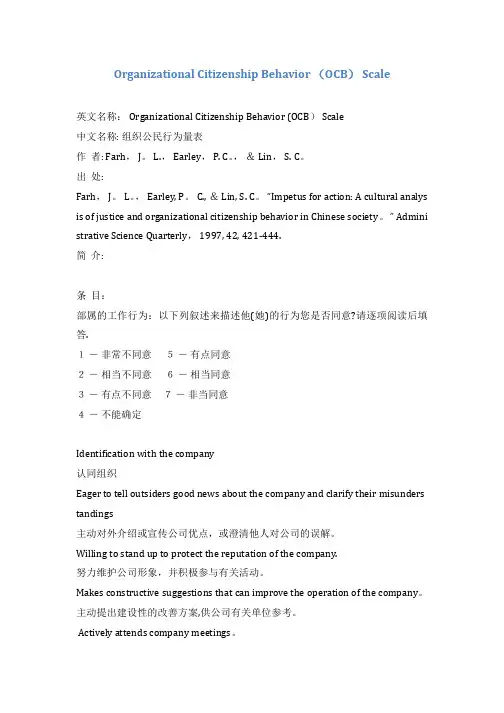
Organizational Citizenship Behavior(OCB)Scale英文名称:Organizational Citizenship Behavior(OCB)Scale中文名称:组织公民行为量表作者:Farh,J。
L.,Earley,P.C。
,&Lin,S.C。
出处:Farh,J。
L。
,Earley,P。
C.,&Lin,S.C。
“Impetus for action:A cultural analys is of justice and organizational citizenship behavior in Chinese society。
”Admini strative Science Quarterly,1997,42,421-444.简介:条目:部属的工作行为:以下列叙述来描述他(她)的行为您是否同意?请逐项阅读后填答.1-非常不同意5-有点同意2-相当不同意6-相当同意3-有点不同意7-非当同意4-不能确定Identification with the company认同组织Eager to tell outsiders good news about the company and clarify their misunders tandings主动对外介绍或宣传公司优点,或澄清他人对公司的误解。
Willing to stand up to protect the reputation of the company.努力维护公司形象,并积极参与有关活动。
Makes constructive suggestions that can improve the operation of the company。
主动提出建设性的改善方案,供公司有关单位参考。
Actively attends company meetings。
以积极的态度参与公司内相关会议。
Altruism toward colleagues协助同事Willing to assist new colleagues to adjust to the work environment.主动帮助新进同仁适应工作环境。
组织亲社会行为的测量、影响因素及效果-组织行为学论文-社会学论文——文章均为WORD文档,下载后可直接编辑使用亦可打印——摘要:不同于亲组织行为、利他行为和主动性行为, 组织中的亲社会行为(prosocial behavior) 指个人为促进或保护他人、团队、组织福祉所采取的行为, 具体包括亲社会组织行为、组织公民行为、指导、知识共享等。
基于量表与实验测量的研究和多样本元分析发现:亲社会行为不仅有利于员工职业成功, 改善工作态度和工作绩效, 而且还能促进组织创新、降低员工流失率、提升组织有效性;而影响亲社会行为的因素则有个人特质、领导风格、同事因素、工作设计等。
本文构建了亲社会行为循环管理机制, 并提出未来理论研究应侧重亲社会行为的测量工具、影响机制、非线性影响、本土研究;而管理实践应重点关注亲社会行为的识别、评估与干预。
关键词:亲社会行为; 组织公民行为; 谏言; 知识共享; 指导;Abstract:Nowadays, work is becoming more team-orientedand flexible. Organizations hope and need employees to help each other, cooperate and share in their work, and devote more energy to the overall interests of organizations beyond the completion of their own work. Prosocial behavior has gradually become an important hot topic in the field of organizational behavior. Previous studies have emphasized the importance of prosocial behavior and achieved some results, but the overall dispersion hinders the development of prosocial behavior research. Therefore, this paper systematically reviews the relevant literature, including the definition of prosocial behavior, similar concepts, measurement methods, antecedents, results, research prospects and practical enlightenment, so as to present a clear and complete development framework, deepen the understanding of prosocial behavior, and provide inspiration for relevant domestic research. More importantly, it can provide reference for the practice of organizational management.Specifically, prosocial behavior in organizations refers to the acts that promote or protect the welfare of individuals, groups and organizations, which is unlike pro-organizational behavior, altruistic behavior and proactive behavior. In the past, OCB is often regarded as the prototypical prosocial behavior. Over the years, with the development of academics, organizational researchers have identified a number of other constructs that are consistent with the definition of prosocial behavior in that they are acts benefiting others: mentoring,knowledge sharing, brokering introductions, and compassion, etc.Based on the extensive independent researches and meta-analysis results of prosocial behavior in China and abroad in recent years, we can see that scale and experiment are the main methods of prosocial behavior measurement. It is worth learning that some scholars combine the two methods in their studies.At the individual level, prosocial behavior is beneficial to employees working attitude, performance and career success; at the organizational level, prosocial behavior can promote the innovation of organizations, decrease the turnover rate of the staff, and improve the effectiveness of organizations.However, some studies also show that prosocial behavior can lead to negative effects. The factors that influence prosocial behavior are personality traits, peers, leadership and job characteristics, etc. On the above basis, this paper constructs a prosocial behavior cycle management mechanism, which integrates specific measures to stimulate prosocial behavior into human resource management practice such as recruitment and selection, training, performance appraisal, salary incentives, job design, etc. It is suggested that future theoretical research should focus on the measurement tools, impact mechanism, non-linear impact and local research of prosocial behavior, while management practice should focus on the identification, evaluation and intervention of prosocial behavior.Keyword:prosocial behavior; OCB; voice; knowledge sharing; mentoring;一、引言1861年, 林肯(Abraham Lincoln) 总统就曾在其就职演讲中呼唤人性中的善良天使, 并鼓励同胞为了更大的民族利益而行事。
试论组织公民权行为综述论文关键词:组织公民权行为;特征变量;结果变量;群体组织公民权行为论文摘要:首先分析总结了文献中出现的OCB的维度变量,主要列举出了6种,然后就OCB的特征变量和结果变量的研究结果进行了总结,最后就将来的研究方向给出了一些建议:如OCB与特征变量和结果变量的研究,跨文化环境下OCB的研究,OCB的负面效应以及研究方法的拓展等。
1、引言在过去的20多年里,对组织公民权行为( Organizational Citizenship Behavior,OCB)的研究不断深人,并且取得了有意义的成果,但总体而言,仍然处于研究的初级阶段。
研究还比较零乱,不同的学者从不同的方面来研究,这就使得好多对OCB感兴趣的学者不知道如何进人到这个领域中来。
基于这种状况,作者就目前研究的一些发展动态做了初步的总结。
OCB的概念最早来源于Bamard在1938年提出的“想要合作的意愿”。
Organ在1988年提出了OCB概念,认为:OCB就是在组织正式的薪酬体系中尚未得到明确的和直接的确认,但就整体而言,却有益于组织运作成效和业绩的行为总和。
Organ在后来的研究中,又对OCB进行了重新定义,认为它类似于Berman等人在1993年提出的关系绩效,即能够对组织的社会和心理环境提供维持和增强作用,从而把OCB和关系绩效的内涵统一起来。
但是,关于OCB是否与内部角色行为有区别仍存在着争论。
依据Organ的定义,判断一个行为是否属于OCB,最好问下列3个问题:①行为是员工工作明确规定的部分;②是组织培训员工去做的一些事;③当展现这些行为时,应该得到奖励,同时没有这些行为时,也要得到相应的惩罚。
Park等人的研究表明,OCB影响管理者的一些决策,如员工提升、培训、奖金分配等。
这些结果显示:管理者既把OCB认为是员工工作的一部分,也扩展到一切有助于组织业绩的行为。
本文首先对各种形式的OCB以及其组成部分进行区分,分析他们的共同点和差异;其次对OCB的特征变量做简单的总结;再次把注意力放到OCB的结果上,即OCB对业绩评价的影响结果;最后,就未来研究给出了一些建议。
组织公民行为对员工的负面影响及管理策略张桂平;刘玎【摘要】Academic research on organizational citizenship behavior basically focus on its positive impact on the organization,while the study on mechanism of the how this behavior influence on individual level is relatively deficient.On the basis of summarizing recent research from western scholars,the author analyze the negative effects that the organizational citizenship behaviors put on the individual in many aspects,like employees'being stressful,negative impact on the individu-al task performance and the negative impact on the career development of the individual.Then the author proposed motivate-oriented management,organizational management,human resource management,and other management measures.At last,the author forecasted the future research on organizational citizenship behavior.%学界对组织公民行为的主流研究基本集中在其对组织的积极影响方面,而针对这种行为对员工个体层面的影响机制的研究还相对匮乏。
RATINGSOFORGANIZATIONALCITIZENSHIPBEHAVIOR:DOESTHESOURCEMAKEADIFFERENCE?
TammyD.AllenTheUniversityofSouthFlorida,Tampa,FL,USASteveBarnardMichaelC.RushJoyceE.A.RussellTheUniversityofTennessee,Knoxville,TN,USA
Thisstudycomparedmultipleratingsoftheorganizationalcitizenshipbehavior(OCB)ofmanagersobtainedfromthreedifferentsources:self,superiors,andsubordinates.Theresultsexaminingconvergenceacrosssourcesdemonstratedthattherewerestrongercorrelationsbetweenratingsmadebyothers(subordinatesandsuperiors)thanbetweenratingsmadebyselfandothers.Theresultsalsoindicatedthatthereweremeanleveldifferencesinratingsacrosssources.Specifically,ratingsmadebyselfandsuperiorswerehigherthanwereratingsmadebysubordinates.TheresultsexaminingconvergencewithinsourcessuggestedthatthereliabilityofOCBratingsbasedonasingleraterwerequitelow;however,reliabilityincreasedconsiderablywhenaggregatingraters.Futureresearchandimplicationsarediscussed.
INTRODUCTIONInrecentyears,thetopicoforganizationalcitizenshipbehavior(OCB)hasgeneratedaconsiderableamountofscholarlyattention(cf.,Bateman&Organ,1983;Organ,1988,1990;Smith,Organ,&Near,1983).OCBembodiestheconstructiveandcooperativegesturesthatareneithermandatedbyformaljob±roleprescriptionsnordirectlyorcontractuallycompensatedforbytheformalorganizationalrewardsystem.Suchbehavior(e.g.,volunteeringtodoextrawork;persistingwithextraeffort)whenaggregatedovertimeandpeopleservestoenhancetheeffectivefunctioningoftheorganization(Organ,1990;
Directallcorrespondenceto:TammyD.Allen,DepartmentofPsychology,TheUniversityofSouthFlorida,4202EastFowlerAvenue,BEH339,Tampa,FL33620-8200,USA;E-mail:tallen@luna.cas.usf.edu
HumanResourceManagementReview,Copyright#2000Volume10,Number1,2000,pages97±114byElsevierScienceInc.Allrightsofreproductioninanyformreserved.ISSN:1053±4822Organ&Konovsky,1989,Podsakoff&MacKenzie,1997).ThoughgreatstrideshavebeenmadeinunderstandingthenatureofOCBandsomeofthemotivationalbasesofthistypeofbehavior(e.g.,George,1990;Organ,1990;Organ&Konovsky,1989;Organ&Ryan,1995),thisareaofstudy,likemostresearch,isconstrainedbythereliabilityandvalidityofthemeasurementsystemsemployed.ThediscretionarynatureofOCBandthefactthatmultiplerecipientsmaybethebeneficiaryofthebehavior(McNeely&Meglino,1994)posesaparticulardilemmaforresearchersastotheappropriatesourcetoevaluatecharacteristiclevelsofOCB.MostofthestudiesinvestigatingOCBhavereliedalmostexclusivelyonratingsprovidedbyasinglesupervisortoassessOCB(e.g.,Bateman&Organ,1983;Moorman,1991;Organ&Konovsky,1989),eventhoughthelimitationsofsuchanapproachhavebeennotedseveraltimes(cf.,Organ,1988;1990).Theuseofsupervisoryratingsmitigatesconcernsregardingtheproblemofcommonmethodvariancethatcanarisewhenself-ratingsofOCBareobtainedalongwithself-reportsofothervariablesofinterest(Organ&Ryan,1995).However,agreatdealofcitizenshipbehaviormayescapetheattentionofthesupervisor(Organ&Konovsky,1989).Likewise,asnotedbyMoorman(1991),OCBconsistsofagreatvarietyofbehaviors,onlysomeofwhichmaybeperformedwithintheviewofthesupervisor.Indeed,manycitizen-shipbehaviorsmaybemorelikelytobedisplayedinfrontofsubordinatesorotherco-workersthaninviewofsupervisors.Further,theissueofratingsourcewasfoundtoberelevantinarecentmeta-analysisofOCBresearch.Themeta-analysisrevealedthattherelationshipbetweenOCBandjobattitudesvariedasafunctionofratingsource(self-ratingsvs.ratingsmadebyothers)(Organ&Ryan,1995).Specifically,meancorrela-tionsandthevarianceinthecorrelationswereinflatedwhenself-ratingswereincludedintheanalyses.Theauthorsstatethattheobserveddifferencesweredue,onlyinpart,tocommonmethodvariance.Suchperspectivessuggestthatexclusiverelianceonanyoneparticularsourceofratingsmaylimitourcapabilitytofullyunderstandthenatureandconsequencesofcitizenshipbehaviors.Thatis,ifdifferentratingsourcescanprovideauniqueandreliableperspectiveontheperformanceofOCB,theninvestigatingOCBthroughtheuseofonlyoneparticularratingsourcemayresultinatypeofcontentdomainlossmuchliketheissueofcriteriondeficiency.ThepurposeofthepresentarticlewastoexaminethecomparabilityofratingsofOCBprovidedbydifferentratingsources.Assuggestedpre-viously,itispossiblethatanumberofpeopleoccupyingdifferentpositionswithinanindividual'ssocialnetworkmayhavetheopportunitytoobserveactsofOCBandhence,mayserveasuniquelyvalidsourcesofOCBratings.However,thispropositionrequiresempiricalscrutiny,giventhatsupervisorshaveservedasthesourceofchoiceformostOCBratings.Thatis,thereiscurrentlylittleinformationavailableregardingthenatureofOCBratingsprovidedbyothersourcesandhowthoseratingsmay